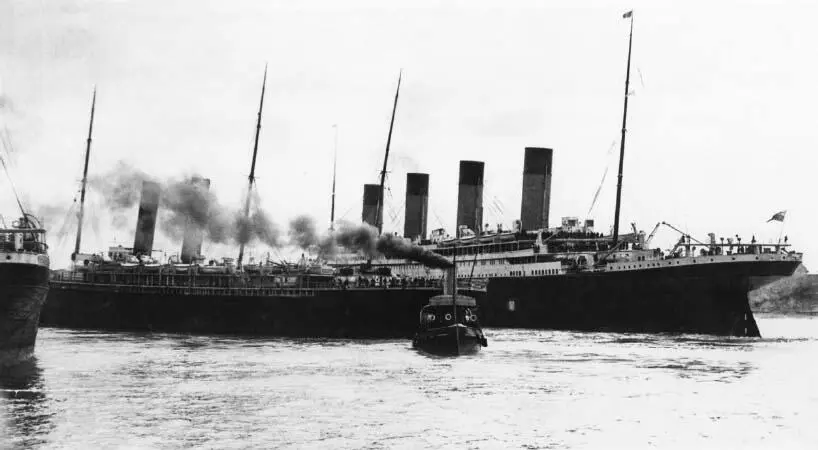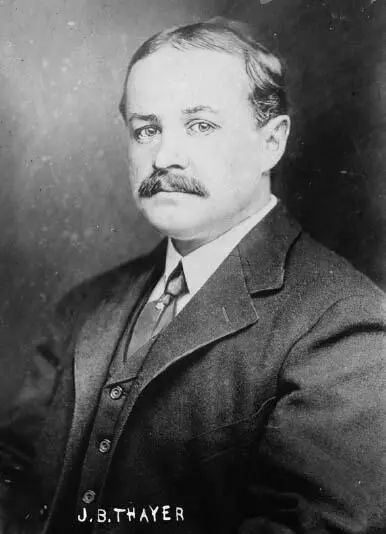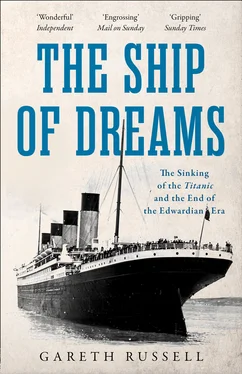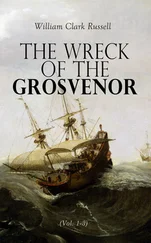An explanation for this arrived when her husband returned. Sixty-seven years old, bald, with a well-trimmed white beard and occasional pain in his legs, Isidor told Ida that, as the Titanic set off, the suction from her three enormous propellers had caused the New York to break free from her moorings and drift towards her. A quarter of a century earlier, Isidor had sailed on the New York ’s maiden voyage from Liverpool, when she had been considered ‘the last word in shipbuilding’.[51] In a harbour overcrowded by ships laid up by the miners’ strike, the coils of the ropes mooring the New York had snapped with a noise like gunfire, whipping back on to the docks to lacerate a woman in the crowd who had to be rushed away to receive medical attention. For one horrible moment, it looked as if there would be a repetition of the Olympic ’s accident the previous year, with a smaller ship sucked into a voyage-cancelling collision.[52] The Titanic ’s Captain had moved quickly to halt the churning of the propellers, giving those in the guiding tugboats time to manoeuvre the New York back to safety.[53]

This photograph caught from the pier shows just how close the New York came to colliding with the Titanic .
The near-collision of the RMS Titanic and the SS New York , 10 April 1912 (Trinity Mirror/Mirropix/Alamy Stock Photo)
The Titanic ’s schedule had been dented before she even left her home waters, but she was intact. Later, many chose to reinterpret the near miss as an omen, such as the large flock of seagulls that Cissy Maioni noticed following the Titanic overhead as the ship resumed her journey.[54] Ida, however, turned back to her letter to Lilian Burbidge, as the waters of the Test became the Solent and then the Channel:
On Board R.M.S. Titanic
Wednesday
Dear Mrs Burbidge,
You cannot imagine how pleased I was to find your exquisite basket of flowers in our sitting-room on the steamer. The roses and carnations are all so beautiful in color and as fresh as though they had just been cut. Thank you so much for your sweet attention which we both appreciate very much.
But what a ship! So huge and so magnificently appointed. Our rooms are furnished in the best of taste and most luxuriously and they are really rooms not cabins. But size seems to bring its troubles – Mr. Straus, who was on deck when the start was made, said that at one time it stroked painfully near to the repetition of the Olympian’s [ sic ] experience on her first trip out of the harbor, but the danger was soon averted and we are now well on to our course across the channel to Cherbourg.
Again thanking you and Mr. Burbidge for your lovely attention and good wishes and in the pleasant anticipation of seeing you with us next summer. I am with cordial greetings in which Mr. Straus heartily joins,
Very sincerely yours,
Ida R. Straus[55]
4
A Contest of Sea Giants
To the battle of Transatlantic passenger service, the Titanic adds a new and important factor, of value to the aristocracy and the plutocracy attracted from East to West and West to East. With the Mauretania and the Lusitania of the Cunard, the Olympic and Titanic of the White Star, the Imperator and Kronprinzessin Cecilie of the Hamburg-Amerika, in the fight during the coming season, there will be a scent of battle all the way from New York to the shores of this country – a contest of sea giants in which the Titanic will doubtless take high honours.
The Standard (5 April 1912)
PASSENGERS WAITING TO BOARD THE TITANIC ATCherbourg, the first of two European ports of call after Southampton, were told of the delay that had arisen as a result of the New York incident by Nicholas Martin, Manager of the White Star Line’s main French office, who had accompanied the firm’s boat train from Paris earlier that day.[1] He broke the news in an uncomfortably pitching tender, the Nomadic , built in Belfast two years earlier and boasting several decorative features like bronze grilles on the doors as aesthetic anticipations to the interiors of her destinations – either the Olympic or Titanic , both too large to dock in Cherbourg’s harbour. First- and second-class passengers were ferried to the waiting liners on the Nomadic ; Third Class and mail were brought out by her partner, the Traffic .[2] Embarkation had been tentatively rescheduled by about ninety minutes for about half-past five at which time, despite the fact that the Titanic had still not actually come into view, the Nomadic ’s skipper moved her off from the little quay and out into the breakwater, where it unhappily became clear that the lovely spring weather had obscured a strong breeze and equally lively currents. Many of the Nomadic ’s 172 passengers became nauseous, either from the pitch or from the enforced cosiness of the crowded boat.[3] Several false sightings of the Titanic raised hopes whose disappointment nurtured irritation. Those with better sea legs distracted themselves with a ‘slight and passing interest in a fishing boat – [then] more waiting’.[4]
Grouped together in the Nomadic ’s stultifying saloon were names that had already earned the Titanic ’s crossing a press-created nickname of ‘the Millionaire’s Special’ – Astors on the final stretch of their honeymoon, a Guggenheim ending his winter on the Riviera, a presidential adviser emerging from a recuperative stay in Rome and a celebrated art historian returning to fractious negotiations about the design of the proposed Washington DC memorial to President Lincoln. By a considerable margin, Americans constituted the majority of the Titanic ’s first-class ticket holders and the reason for this lay in the approaching summer Season. The East Coast upper class’s Season in the United States fell at about the same time as that of their British counterparts, but with far greater precision, lasting from Memorial Day, then commemorated on 30 May, until Labor Day on the first Monday in September, at which point wearing white slipped from a proclamation of belonging to an advertisement of bad taste. Well serviced by railways from the Paris terminals, Cherbourg proved a convenient point of embarkation for those who had spent their winters in the south of France or, equally popular with travelling Americans, Italy.

John Thayer, Second Vice-President of the Pennsylvania Railroad Company.
John Borland Thayer (Granger Historical Picture Archive/Alamy Stock Photo)
Heavy jawed, thickly but tidily mustachioed and eleven days short of his fiftieth birthday, John Borland Thayer Sr, Second Vice-President of the Pennsylvania Railroad, was, like many on the Nomadic that afternoon, a beneficiary of, and participant in, perhaps the greatest sustained economic expansion in recorded history. The assets of the most fantastically beneficed courtier at Versailles in the middle of the eighteenth century would have paled in comparison to the wealth of the American industrialists created in the nineteenth. The first few generations of American millionaires had led the surge that took their country from the British Empire’s most rebellious child to become its competitor and, in the years after 1912, its successor – in 1800, American factories produced just one-sixth the amount churned out in the United Kingdom; by the time the Titanic sailed, they were making 230 per cent more, accounting for 32 per cent of global industrial production, compared to 14 per cent from the admittedly far smaller Britain.[5] This growth had been sustained, at least initially, by an appalling humanitarian cost to America’s labourers – ‘the cost of lives snuffed out, of energies overtaxed and broken, the fearful physical and spiritual cost to the men and women and children upon whom the dead weight and burden of it all has fallen pitilessly’, in the words of Woodrow Wilson, the soon to be Democratic nominee for the US presidency.[6] When the heir to the Austrian throne, the Archduke Franz Ferdinand, visited the United States in 1893 he had praised the Great Republic’s federalist structure but expressed horror at the treatment of the country’s workers, who, he believed, endured conditions far worse than anything seen in the more technically unequal kingdoms and empires of Europe. It was after his stay in New York that Franz Ferdinand concluded that in America, it seemed to him, ‘For the working class, freedom means freedom to starve.’[7] The Archduke’s depressing conclusions were unknowingly corroborated by one of his uncle’s former subjects, an immigrant to New York called Faustina Wiśniewska, who wrote home to her parents in the same year to tell them that ‘here they exploit the people as they did the Jews in Pharaoh’s time’, and by several prominent American industrialists, like bosses at the Carnegie steel conglomerate who issued advice to avoid placing orders with foreign factories, not for any reasons of national loyalty, but because foreigners, particularly the British, were ‘great sticklers for high wages, small production, and strikes’.[8]
Читать дальше














